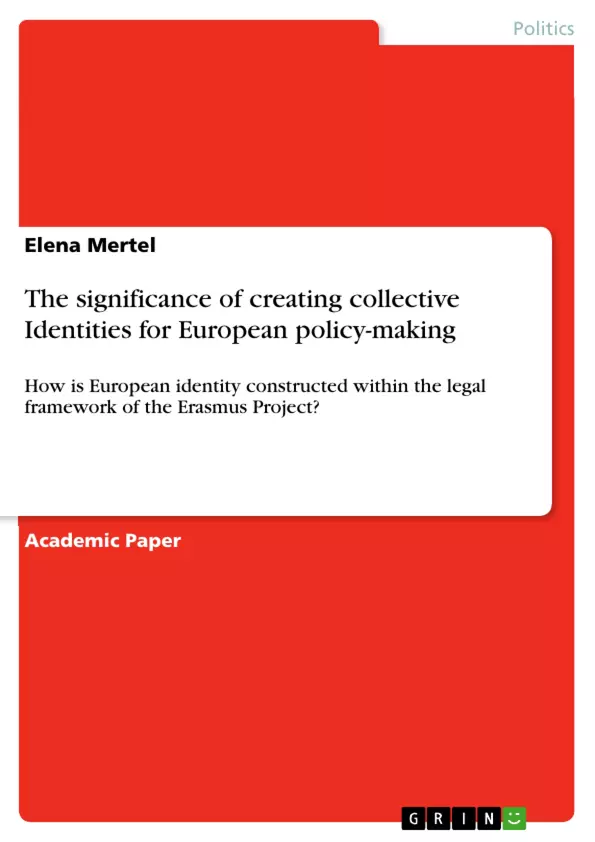The perception of a collective identity is of great significance for policy-making processes. This paper substantiates the following claims: collective identities are socially constructed and the political attention toward a shared European identity has steadily grown within the past decades. This shift is visible within the legal framework of the Erasmus project which has become the EU's flagship in terms of identity shaping processes. While the 1987 decision on establishing Erasmus lacked indicators of an identity-shaping purpose the renewed Erasmus+ regulation puts a clear focus on the idea of creating a European mindset.
Inhaltsverzeichnis (Table of Contents)
- Introduction
- Section 1 - Theoretical Framework
- Section 2 - Discourse Analysis of European Identity in the Erasmus Programmes
- Conclusion
Zielsetzung und Themenschwerpunkte (Objectives and Key Themes)
This research paper examines the construction of European identity within the legal framework of the Erasmus programmes. The paper aims to demonstrate the significance of collective identities for policy-making and how the concept of European identity has evolved within the Erasmus project.
- The significance of collective identities for policy-making
- Social constructivism and its application to European identity
- The evolution of European identity within the Erasmus programme
- The impact of the Bologna Declaration on Erasmus+
- The relationship between economic interests and the identity-shaping character of the Erasmus project
Zusammenfassung der Kapitel (Chapter Summaries)
- Introduction: This chapter establishes the context for the research, exploring the significance of a shared European identity in the face of challenges to European integration. It introduces the Erasmus project and its historical evolution, highlighting the shift from a purely economic focus to a focus on fostering a European mindset.
- Section 1 - Theoretical Framework: This chapter provides a theoretical framework for understanding collective identities, particularly European identity. It draws on sociological institutionalism and constructivist theories, exploring the relationship between identity, culture, and community. The chapter also discusses the dynamics of in-group and out-group bias and their implications for political decision-making.
Schlüsselwörter (Keywords)
The main keywords and focus topics of the text are: European identity, policy-making, social constructivism, Erasmus, Bologna Declaration, collective identities, international institutions, and in-group bias.
Frequently Asked Questions
What is the significance of collective identities in policy-making?
Collective identities create a sense of belonging that can legitimize political decisions and foster cooperation across national borders.
How has the Erasmus project evolved regarding European identity?
While early stages focused on economic mobility, the modern Erasmus+ regulation clearly aims to foster a shared "European mindset."
What is social constructivism in the context of Europe?
It is the theory that European identity is not innate but socially constructed through interaction, education, and political frameworks.
What role does the Bologna Declaration play?
It harmonized European higher education systems, making it easier for students to move between countries and fostering a collective academic identity.
What is "in-group bias" in European policy?
It refers to the tendency of individuals to favor those they perceive as part of their own group (Europeans), which can influence political support for EU integration.
- Arbeit zitieren
- Elena Mertel (Autor:in), 2018, The significance of creating collective Identities for European policy-making, München, GRIN Verlag, https://www.grin.com/document/498134



